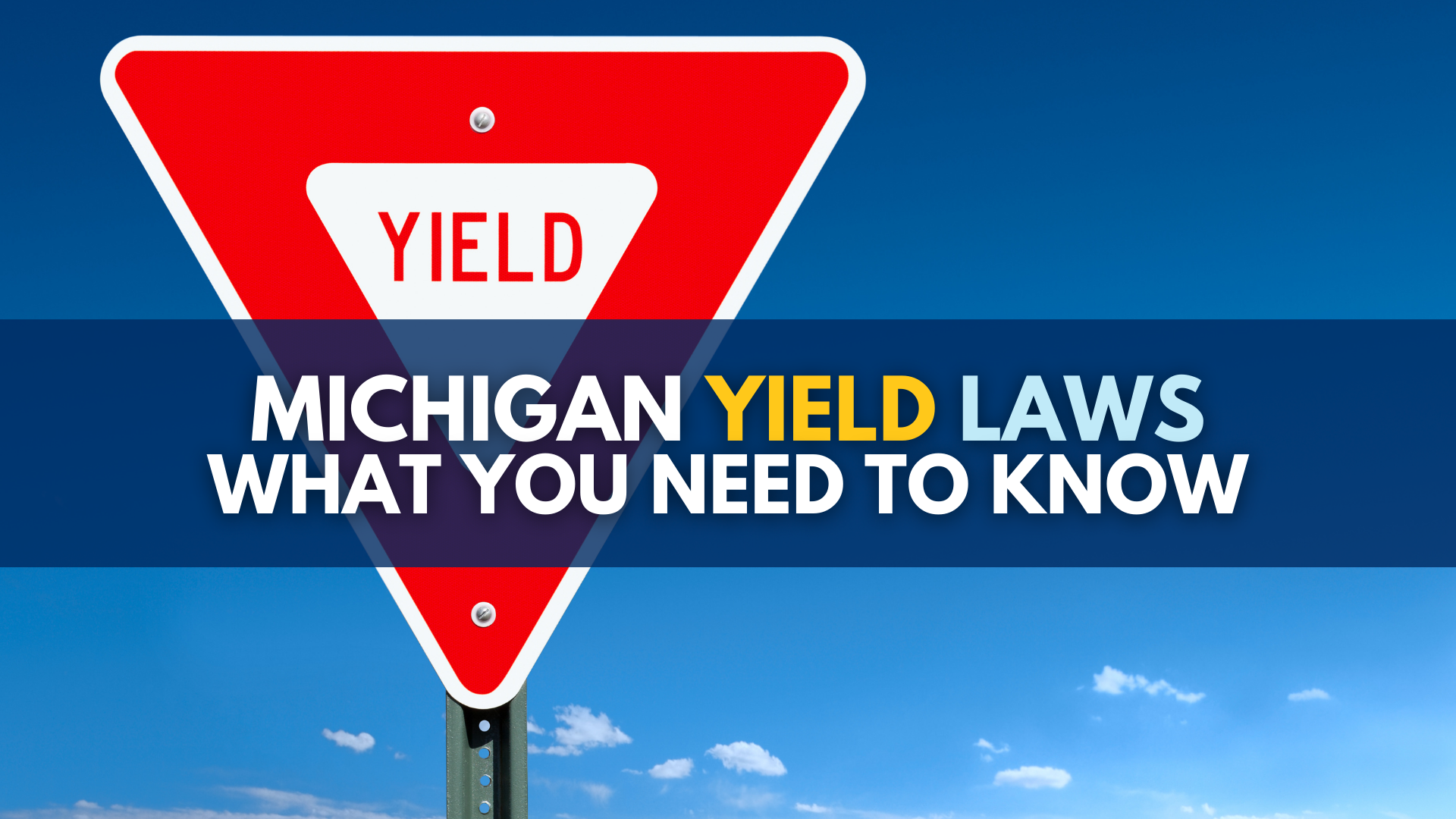The Michigan yield laws set forth the circumstances in which drivers in Michigan must yield the right of way: (1) when traveling through intersections, (2) when making left turns, (3) when pedestrians and bicyclists are in a crosswalk, (4) when merging onto the highway, and (5) when encountering an emergency vehicle.
When people know, understand and obey the Michigan yield laws, the roads are safer for everyone.
What are the Michigan yield laws at intersections?
The Michigan yield laws require that a driver who is approaching an intersection must yield the right of way to a vehicle that has already entered the intersection from a different road or street. (MCL 257.649(1)) However, when two drivers from different roads enter an intersection at approximately the same time, the driver on the left must yield the right of way to the driver on the right. (MCL 257.649(2))
Yield sign at intersection
When a driver encounters a yield sign at intersection, he or she must slow down and yield the right of way to vehicles that are already in the intersection or are so close to the intersection as to be “an immediate hazard” to the driver as he or she moved across or within the intersection. (MCL 257.649(6))
Stop sign at intersection
When a driver encounters a stop sign at an intersection, he or she must stop and then yield the right of way to any vehicles that have entered the intersection from an intersecting road or that are close enough on the road to “constitute an immediate hazard” to the driver as he or she is moving across or within the intersection. (MCL 257.649(8))
Michigan yield laws for intersections where the traffic lights are out
When a driver approaches an intersection where the traffic lights are out or they’re not functioning properly, the Michigan yield laws provide that he or she must: (1) stop before entering the intersection, (2) yield the right of way to vehicles in the intersection or approaching on an intersecting road if they will pose an “immediate hazard” to traveling through the intersection, and (3) exercise “ordinary care” while proceeding through the intersection. (MCL 257.649(4))
Left turns at intersection
When a driver is turning left within an intersection, he or she must yield the right of way to vehicles approaching from the opposite direction in the oncoming traffic lanes that are either already within the intersection or so close to the intersection that they “constitute an immediate hazard.” (MCL 257.650(1))
However, once the driver is in the process of completing his or her left turn, drivers of vehicles approaching the intersection from the opposite direction must yield the right of way to the left-turning driver. (MCL 257.650(1))
Turning left somewhere other than an intersection
When a driver is going to turn left somewhere than an intersection and he or she must cross a lane of traffic traveling in the opposite direction, the driver must yield the right of way to all vehicles approaching from the opposite direction who are so close “as to constitute an immediate hazard.” (MCL 257.649a(1))
Pedestrians in crosswalks
The Michigan yield laws require that drivers who are turning left or right on a green light or red light at an intersection must yield the right of way to pedestrians who are lawfully within an adjacent crosswalk. (MCL 257.612(1)(a), (c)(ii), and (d))
Bicyclists in crosswalks
Under the Michigan yield laws, a driver who is turning left or right on a green light or red light at an intersection must yield the right of way to bicyclists who are lawfully within the intersection or an adjacent crosswalk. (MCL 257.612(1)(a), (c)(ii), and (d))
Michigan yield laws for merging into highway traffic
When a driver is merging onto a highway or other roadway from “a merging highway or street” that is marked with “appropriate merge signs,” he or she must yield the right of way to traffic on the highway or road he or she is attempting to merge onto, adjusting the driver’s speed “so as to enable it to merge safely with the through traffic.” (MCL 257.649(9))
Entering or crossing a street
When a driver is entering or crossing a “highway” (i.e., a street) from an alley, private road, or driveway, he or she must first come to full stop and then yield the right of way to vehicles that are approaching on highway or street. (MCL 257.652(1))
Michigan yield laws for when an emergency vehicle approaches
When an authorized emergency vehicle (with its lights flashing and its siren activated) approaches, the Michigan yield laws require drivers of non-emergency vehicles must yield the right of way by pulling over to the right side of the road as far as possible and remaining there until the emergency vehicle has passed. (MCL257.653(1)(a))
An “authorized emergency vehicle” includes fire trucks, police cars, ambulances, and road service vehicles (such as a wrecker, tow truck or a “vehicle used to assist disabled vehicles”). (MCL 257.2(1)(a) and (c))
Failure to yield the right of way to an approaching emergency vehicle is a civil infraction. (MCL257.653(3))
Stationary emergency vehicle
When a driver is approaching a stationary authorized emergency vehicle with its lights activated, the driver shall (1) proceed with caution, (2) reduce his or her speed to 10 mph under the posted speed limit and (3) yield the right-of-way by moving into another lane or driving at least “2 vehicle widths” apart from the vehicle. (MCL 257.653a(1)(a))
An “authorized emergency vehicle” includes fire trucks, police cars, ambulances, and road service vehicles (such as a wrecker, tow truck or a “vehicle used to assist disabled vehicles”). (MCL 257.2(1)(a) and (c))
Failure to yield the right of way to an emergency vehicle is a civil infraction and a $400 fine. (MCL 257.653a(2))
If a violation of this Michigan yield law results in injury to a police officer, firefighter or other emergency personnel, it is a felony punishable by a fine of up to $1,000 or up to 2 years in prison or both. (MCL 257.653a(3))
Additionally, if a violation of this Michigan yield law results in the death of a police officer, firefighter or other emergency personnel, it is a felony punishable by a fine of up to $7,500 or up to 15 years in prison or both. (MCL 257.653a(4))
Stationary solid waste collection vehicle
When a driver is approaching a stationary solid waste collection vehicle (i.e., a garbage truck) with its lights activated, the driver shall (1) proceed with caution, (2) reduce his or her speed to 10 mph under the posted speed limit and (3) yield the right-of-way by moving into another lane or driving at least “2 vehicle widths” apart from the vehicle. (MCL 257.653b(1)(a)
Stationary utility service vehicle
When a driver is approaching a stationary utility vehicle with its lights activated, the driver shall (1) proceed with caution, (2) reduce his or her speed to 10 mph under the posted speed limit and (3) yield the right-of-way by moving into another lane or driving at least “2 vehicle widths” apart from the vehicle. (MCL 257.653b(1)(a))
Stationary road maintenance vehicle
When a driver is approaching a stationary road maintenance vehicle with its lights activated, the driver shall (1) proceed with caution, (2) reduce his or her speed to 10 mph under the posted speed limit and (3) yield the right-of-way by moving into another lane or driving at least “2 vehicle widths” apart from the vehicle. (MCL 257.653b(1)(a)
Railroad crossing
When a yield sign is posted at a railroad crossing, drivers must “maintain a reasonable speed” as they approach the sign and then they “shall yield the right-of-way” to a train as the circumstances require. (MCL 257.668(2))
Funeral procession
Drivers of all other vehicles except firetrucks, ambulances and police cars must yield the right of way to vehicles that are part of a funeral procession that is on its way to a place of burial. The lead and last vehicle in the process must have a flag that reads “funeral.” (MCL 257.654(1))
What is the penalty for violating the Michigan yield laws?
Generally, the penalty for failing to yield the right of way as required by Michigan is a civil infraction. Additionally, you will be required to pay a fine of up to $100, court costs, and a justice system assessment. (MCL 257.907(2)(a), (4), and (12))
Injured by a driver who violated the Michigan yield laws? Call the car accident attorneys at Michigan Auto Law
If you have questions about what to do after you were injured by a driver who violated the Michigan yield laws, call now at (888) 857-9250 for a free consultation with one of our experienced car accident lawyers. There is no cost or obligation. You can also visit our contact page or use the chat feature on our website.
Michigan Auto Law is Michigan’s largest and most successful law firm that specializes exclusively in helping people who have been injured in auto accidents.
Our secret? Our attorneys deliberately handle fewer cases than other personal injury law firms. This allows us to focus more time and attention on our cases.
Unlike other law firms, our attorneys are never too busy to promptly return phone calls and answer questions.
We have more than 2,000 5-Star reviews that reflect this care and attention to detail.
More importantly, this client-focused approach leads to better and faster settlements for our clients. Michigan Auto Law has recovered more million-dollar settlements and trial verdicts for motor vehicle accidents than any other lawyer or law firm in Michigan. We’ve also recovered the highest ever reported truck accident and car accident settlement in the state.
Call now so we can start making a real difference for you.



